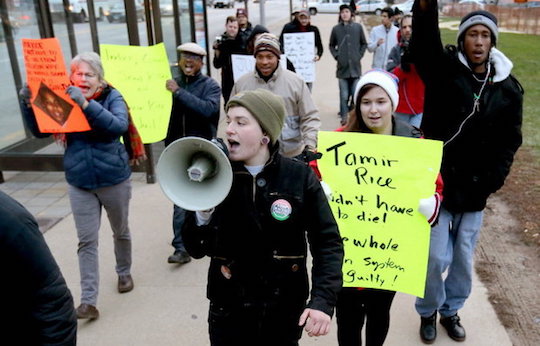For a while now, I’ve been thinking about the slippery slope between objecting to cultural appropriation and demanding cultural segregation. It’s probably appropriation for Eminem to release two of the three top-selling rap albums of all time, but is it appropriation for white kids to listen to Outkast? It would be appropriation for me to write a play about slavery, but surely I can still eat soul food. Anyway, there’s no point in examining these questions now, because Oberlin students have obliterated the field of inquiry with genius satire. At least I hope it’s satire. Per the New York Times:
[An article] published by The Review in November, detailed what students said were instances of cultural appropriation carried out by [food service provider] Bon Appétit. The culinary culprits included a soggy, pulled-pork-and-coleslaw sandwich that tried to pass itself off as a traditional Vietnamese banh mi sandwich; a Chinese General Tso’s chicken dish made with steamed instead of fried poultry; and some poorly prepared Japanese sushi.
First of all, General Tso’s chicken is hardly authentic Chinese culture, and making sushi poorly isn’t appropriation. Would a just world only allow ethnically Japanese people to make sushi? That sounds structurally similar to old-school racism—a system that makes race a totalizing identity and rigidly enforces separation, just without the normative component that declares one race superior to another. But again, Oberlin students are way ahead of me:
Last week, Oberlin’s black student union issued a list of demands to campus administrators, which include the creation of segregated safe spaces for black students on campus, and an annual 4 percent increase in black student enrollment.
There you go. Finally, after decades of struggle, the civil rights movement might achieve a lunch counter for blacks only. Now is a good time to remember that these are well-intentioned young people whose concerns are probably not as ridiculous as news reports make them sound. But they are also students at a private college, and “justice” in their world is not too different from their own comfort. “The food in the dining hall sucks” has become “the food in the dining hall is immoral.”





It seems this is a Supreme Court moment at Oberlin, as you said, where justice is excised from the repertoire of labels and where authenticity is on trial by what opposes taste, competance, appetite, and the totality of the Same as normative stresses of discipline; ie, race studies, history, and the human condition. Are all angles of opposition that which leads to segregation? I would add, as prefecatory instance, that appropriation in its legal usage is the suggestion that intellectual property (rather than the quaint social justice of food labels) can change or be transmitted as an entity, and that laws provided overarch a global structure of supply, exchange, and demand. Were the Oberlin students simply not paying for their meals? Who makes the food appropriate as a comprimise to the West characteristics which might call it American appetite has nothing to do with the civil justice of allowing immigrants, refugees, and even Oberlin’s undergraduate population prepare the food itself or, in a matter worse, select it.